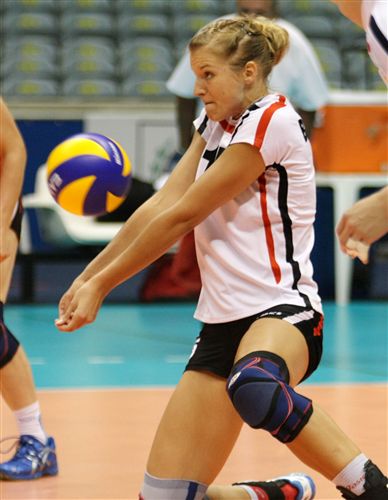I saw an interesting stat on scholarshipstats.com and as a volleyball parent, I needed to share.
You can become 1 of the 5.9% who play women’s volleyball collegiately if you are the right player.1 Everyone has heard someone say, in some form, that applying hard work and dedication to anything will aid you in succeeding. Perfecting your serve, timing your hits and court awareness are important aspects to the game required to play at the college level that every coach expects. But what is not talked about often enough are the greatest skills that appeal to college coaches.
Yes, Listening
Listening is defined by Merriam-Webster as “to hear something with thoughtful attention”. Listening is a step beyond hearing what someone has to stay. The difference between hearing and listening, from a coach’s perception, can be in subtleties, such as making eye contact with your coach when they are speaking, facing towards them and responding with acknowledgment. But, then you need to “DO”! Show your coach that you are worth the time of instruction and act on what they said. You will reap the rewards with more instruction as the coach will put in more effort to improve the right player.
The Right Attitude
Being the right player for a coach and team is more than just following what a coach says. The right player maintains positivity and composure throughout each and every set, but just as important, they maintain in throughout practice. When a player can’t shake off a previous play, when they are foul mouthed about the refs calls, when they are sour about not succeeding in their position, they are detrimental to the team. An attitude, albeit a negative or positive one carries from play to play. This often is a determining factor in a game being won or lost when matches are tight.
Not just Communication, but clear communication
Clear communication is key to harmonious team play. On court communication, such as calling out the teammate you are bumping to, “I’ve got it” and “Help”, are paramount to working efficiently towards a side out. An outside hitter who is silent will play the ball less than a more vocal player. But, the right player communicates clearly to not just the team, but to the coach as well. In the business world there is a theory of managing up. Clearly communicating your needs, information and expectations to your manager or coach help unblur any lines. Working with a coach to have a positive relationship, understanding their needs or goals and anticipating those needs will ensure they work most efficiently with you. This is especially important in developing new coach relationships.
Drive
Some players have a natural athleticism and those children who seemingly do very well at a young age don’t necessarily possess what it takes to get to the next level. When others, whom were not the best on their respective teams, seem to make the distance. They both possess some of the same fundamental skills: passing, setting, spiking, digging, serving and blocking. So, what is the difference? What set them apart? I had a high school coach, Coach D, once tell me, “Games are not just won on the field. They are won off the field.” And, he was right! All the right players were offered opportunities to play sports at the collegiate level were the same ones who “won off the field.” They would put in the extra time on their respective sport, bettering themselves with fundamental drills, increase stamina and strength training to name a few. The effort you put in off the court may very well be worth more than what you put in while on the court.
Grades
A hitting percentage > .500, kills north of 700 or more than a few hundred blocks will get you noticed by top colleges. But most players will not see even a fraction of those numbers in the high school carrier. Another great way to be noticed by college coaches is by your GPA. The right player that has a good head on your shoulders, a focused future track and are a well-rounded person will create less drama and grief in their coach’s life. They will be more teachable, retain more faster and be more equipped when “test” time comes around, the big game. Coaches are often juggling a full-time job, a family/life and acting as a coach. Having players with less hassles means more focus on the right players, instead of the coach having to worry about losing players to lower GPA than required to play.
Having the right grades, drive, communication, listening skills and attitude leading up to college, can setup you up for an easier after-college life. After all, you are going to college to get an education and get the job of your dreams, right! My father said to me “Work hard for 4 [years] and you can play for the next 40”. Which is much better than the alternative!
So, are you the Right Player?
5.9% statistic from http://www.scholarshipstats.com/volleyball.htm


